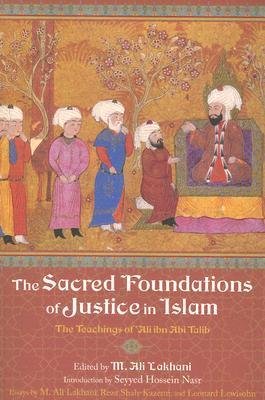In the first essay by M. Ali Lakhani, the author discusses Imam Ali’s mission of truth and justice where truth is the discernment of reality and justice is the conforming of creation to the order of that reality. He argues that because man is made in the image of God, reality is discerned through knowledge of the self. This knowledge allows the microcosm (the individual) to resonate with the macrocosm (the whole of creation). Being God’s representative on earth, man has a responsibility to do justice.
Truth and justice are ontologically linked at the level of ‘knowing’ reality (truth) and subsequently ‘conforming’ to it (justice). Because justice follows truth, one must first become just in order to do justice. Imam Ali says
“knowledge is linked to action,
so one who knows acts,
as knowledge calls for action
and will depart,
if it is not answered”.
In the second essay, Reza Shah-Kazemi explores themes of justice in Imam Ali’s famous letter to Malik al Ashtar, his appointed governor for Egypt. The first requirement for a ruler to be just is, through the mercy and grace of God, to overcome the natural egotistic inclinations of the self and reach the deeper, divine reality innate in every person. This is because while punishments for corruption and abuse of power can be legislated, the ability to be incorruptible cannot. Then, the ruler must recognize their spiritual position – not as a ruler above the people to be heard and obeyed, but as a humble servant beneath God. Otherwise, pride leads to corruption of the heart, reversing the effects of the first point with disastrous consequences. This spiritual position must also be recognized within the individual his or herself not to allow their soul to hear and obey the ‘self that commands to evil’. Before ruling over others with justice, the ruler must rule over himself with justice by overcoming this self and obeying the intrinsic moral conscience. Next, the aspect of compassion must be included in the ruler’s justice: severe punishments are to be issued to officials that abuse their post but forgiveness and mercy should be bestowed on the subjects for their deliberate or accidental mistakes. Just as the ruler would like the forgiveness and mercy of God for their own sins, the ruler should show these qualities to their subjects.
A crucial point made in the essay is in regards to the Imam’s instruction to put effort into worshipping God, through the formal prayers, the supererogatory prayers, and the remembrance of God for the purpose of drawing near to God. As defined, justice is a sacred quality derived from God, so drawing near to God through worship consequently draws one nearer to justice. On the other hand, worship is also a consequence of justice because God has a right to be worshipped, and justice is giving the rights their dues. The evidence of sincerity in implementing justice is shown by the effort put into its accomplishment, like the evidence of sincerity in worship is shown in its prolongation.
In the final essay by Leonard Lewisohn, the topic is the influence and example of Imam Ali’s spiritual chivalry on the pre 16th century Persian Sufi Sunni mystics. Numerous historical examples from his life are given displaying two important qualities: his preference for mercy over justice and his spiritual combat against the self. For example, in an instance where a murderer was brought before him by a group demanding justice, he went to great lengths to pardon the murderer saying the crime was destined and carried out in ignorance. He then offers to pay the blood money himself. Similarly, when a thief was brought before him, he recites the Quranic punishment for the crime, but pardons the thief saying the item that was stolen was not divinely allotted to the owner and that it was stolen only out of desperation and being driven away from the path of piety by Satan. Again, he offers to pay the wronged party back the value of the goods stolen himself. The author argues that while all of his teachings are Islamic, the conception of virtue is innate in the soul – spiritual consciousness leads to moral consciousness.









